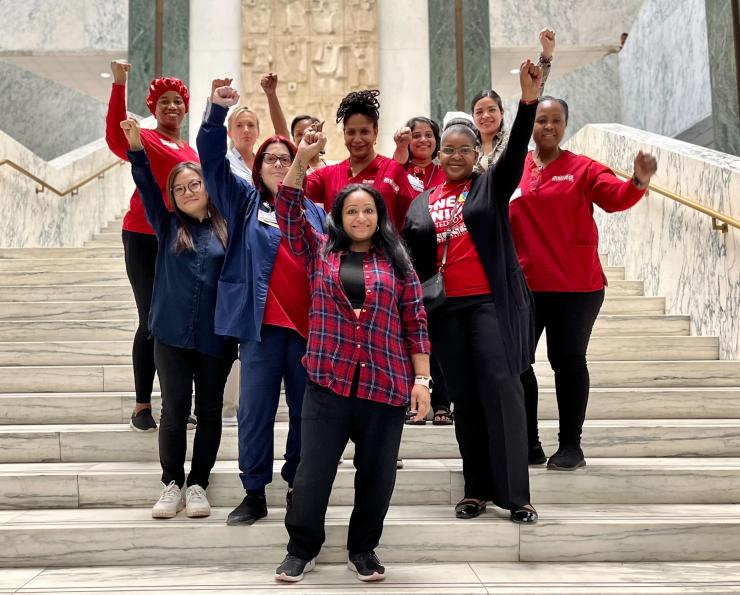NYSNA State FY2024 Budget Summary

The New York State budget that was passed late on May 2 adds $2 billion to the governor’s initial budget proposal, for a final state budget of $229 billion for FY 2024. It includes increases in Medicaid reimbursements for all hospitals and nursing homes, improved services and access to Medicaid and other safety-net programs, and more money to support day-to-day operations and capital needs of safety net hospitals. While NYSNA is pleased to have a state budget that includes increased investments in healthcare services, this budget does not go far enough to address the underlying crisis in our healthcare system.
NYSNA member advocacy successfully defeated several harmful policy proposals, including the interstate nurse licensure compact, the creation of a new medication aides title that would be allowed to administer medications in nursing homes, and several other proposals that could have undermined nursing scope of practice and quality patient care. Our work is far from over – some of these proposals will resurface during the closing days of this year’s legislative session, and we should remain prepared to fight any efforts to erode nursing scope and deskill our profession.
While there is still a staffing emergency declaration in effect, this budget does little to truly address the staffing crisis. There are no specific provisions to improve nursing tuition support and loan forgiveness, increase nursing school teaching capacity, improve recruitment and retention, or support improved working conditions that will keep nurses and other healthcare workers from leaving the bedside. We remain committed to fighting for healthcare justice priorities like the New York Health Act, fully enforced safe staffing standards, recruitment and retention of healthcare professionals, better public sector pension benefits, expanded nursing scope of practice, fair funding for safety-net and public hospitals, and more.
Here are some highlights from the budget:
Nurse Licensure and Scope of Practice
NYSNA successfully defeated proposals to de-skill nursing practice, including proposals to allow nursing aides to administer medications in nursing homes, shift oversight of nursing and other health professions from the Education Department to the Department of Health, allow out-of-state nurses to freely practice in our state without requiring them to get a New York license (interstate nurse licensure compact), and other similar proposals to allow non-nurses to engage in nursing practice.
Hospital and Safety-Net Funding
NYSNA, allied with other unions and healthcare advocates, pushed for substantial increases in funding to allow healthcare employers to address understaffing, maintain the quality of patient care, and expand the availability of needed community health services. The final budget included some increases, but they are not sufficient to address the underlying staffing crisis or to stabilize the finances of safety-net hospitals, which continue to operate under severe financial distress. It should also be noted that some of the increased funding is eroded by cuts in other programs:
- Medicaid in-patient reimbursement rates for hospitals increased by 7.5% (+$319 million).
- Medicaid out-patient reimbursement rates for hospitals increased by 6.5% (+$78 million).
- Healthcare Transformation Capital Funding for safety-net providers for improved infrastructure, IT upgrades, and operating needs (+$1 billion).
- Increase nursing home reimbursement by 6.5% (+207 million).
- Restore $500 million in funding to support distressed hospitals and other safety-net providers (this is $100 million less than was appropriated in last year’s budget, however).
- Expand the number of CPEP programs (+$12 million).
- Much of the added funding for hospitals and safety-nets, however, was offset by the elimination of the 340B Program, which allowed safety-nets to receive medications at steep discounts and use the revenues to support their health programs – reducing net funding for safety net hospitals, FQHCs, and Ryan White AIDS clinics by $410 million.
Expanding Access to Care
NYSNA supports universal access to high-quality healthcare services for all – regardless of ability to pay or any other barriers to getting needed care. We believe healthcare is a human right. The state budget included many measures to improve access to health services and to improve the state’s Medicaid program, but it did not go far enough. We are particularly disappointed that the final budget did not include a proposal to expand the State Essential Plan to include coverage for undocumented New Yorkers. Though there were many improvements in this budget, NYSNA will continue to advocate for the New York Health Act or other legislation at the state and federal level to enact a universal single-payer health system. The budget:
- Expanded services under the Medicaid program, including improved dental coverage, supportive housing, access to preventive mental health services, and extended post-partum coverage for mothers and children (+$64 million).
- Included a Department of Health directive to hospitals to reopen 850 psychiatric beds closed during the pandemic, backed by increased fines for violations of the mental hygiene law.
- Increased access to mental health services (+$69 million).
- Increased the income threshold for participating in the Essential Plan from 200% to 250% of the federal poverty level and made COVID-related temporary expansion in coverage for pregnant people permanent.
Other Notable Budget Provisions
- Increased education funding for pre-K, K-12, and higher education, and no tuition hikes for SUNY and CUNY.
- Minimum wage indexed to inflation to better align wages with the actual cost of living.
- Increased funding and tax credits for childcare services.
- Progress on key climate justice issues, including requiring most new buildings to be zero-emissions after 2026 and a landmark provision to build public renewable energy and transition the state off fossil fuels – with labor standards!